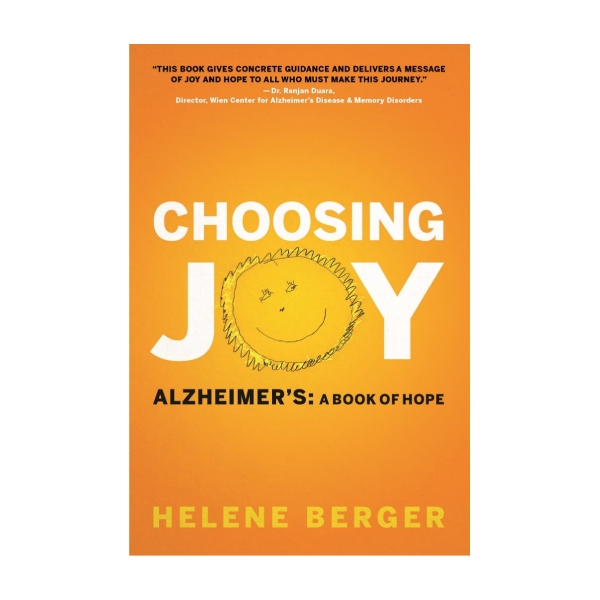HDIS and the family letter introduce you to Helene Berger, author of CHOOSING JOY: Alzheimer’s, A book of hope
Sometimes in life, things fall into your lap that makes a profound impact on your life. Recently, for us, it was the book CHOOSING JOY by Helene Berger. Helene shares her stories and lessons learned from her time as a caregiver for her beloved husband, Ady.
But after reading the first few chapters, we realized the book was so much more. It became an inspiration. It reminded us that we can keep learning, we can tackle hard situations, we can find solutions, and we, too, can Choose Joy.
The book has made such a difference to us at HDIS, that we wanted to share it with all of you in hopes you, too, can gain important insights.
Learn more about how Helene, faced with a reality that she did not choose, moved from total fear to understanding that she had choices. She chose to give the best of herself to her husband while ensuring that her own needs were fulfilled.
I soaked up knowledge everywhere: mostly from my own keen observation of my husband’s reactions; from a friend’s guidance; from a doctor’s advice; from reading helpful books; even from observing negative behavior, like frustration and irritation, towards a spouse who was declining and not responding as they had in the past.
Among my valuable resources was finding HDIS. They now have a 35+ year history and reputation for having the best and most varied products out there. Equally important, is their rare, reliable, and sensitive caring for their customers, who may be going through challenging years. Their goal, more than ever, is not only to provide the best and varied products but to introduce their customers to the best knowledge available: knowledge, that will enhance the lives of those of us who are getting older and those of us who are caring for a loved one who needs extra help.
Most of us who have suddenly become caregivers, whatever the reason for decline, find ourselves totally ill-equipped for what we are about to face. HDIS’ increased focus is to assist their many loyal clients through what difficult years can be. Angela Farrell, HDIS Director of Development & Communications, after learning about and reading CHOOSING JOY, contacted me requesting that I write a piece for their Family Letter asking me to describe my amazing journey and what I learned. Angela and her dedicated staff felt the book, “would be a great resource for our customers and contains so much information that would be helpful to many. I think your book is such a breath of fresh air … and there are so many life lessons as well.” In addition, HDIS thought CHOOSING JOY was so on target for their customers that they are adding the book to their order form.
One of the most debilitating emotions for the caregiver, as we watch our loved one decline, is the feeling of being helpless. Feeling like it was a Greek tragedy where you know the end and there’s nothing you can do to stop it. It was empowering to discover that we can make a difference. We can diminish our loved one’s fear, anger, and frustration simply by the supporting attitude we convey. I’m not suggesting that it’s easy. But all these years later, I am certain the effort is worth it.
A small sampling of those principles:
1. Have him be part of the process
I tried to involve Ady in every decision that was made on his behalf. That enabled him to keep his dignity. He was a successful man and was not used to being told what he had to do.
2. Not Now vs. Never
When it was becoming obvious that Ady should no longer be driving, I was gearing up for the typical royal battle. It was handled, not by me, but in a doctor’s office: “Ady, you’re on a lot of new medication, perhaps you should stop driving until you see how you react to it.” He never asked to drive again. (I think he was inwardly relieved.)
3. Question vs. Command
No adult (or child) wants to be told what to do. I learned that even a simple statement like a cheery, “Your breakfast is ready.” is different from a cheery, “Are you ready for breakfast?” The first is an implied command. The second makes the choice his.
4. Avoid confrontation
I soon learned that I never won with a confrontation even if what he needed to do was essential. The book gives suggestions of how I handled different situations.
5. Offer choices whenever possible
Give options: Pick 3 movies you know he would like. Ask which one he would like.
6. The unknown is frightening. Keep a sense of order
Ady was disoriented and uneasy if he did not know what the day’s plan was. I had different charts all over (which he checked many times a day) spelling out what the day’s plan was and when his extensive medication had to be taken.



